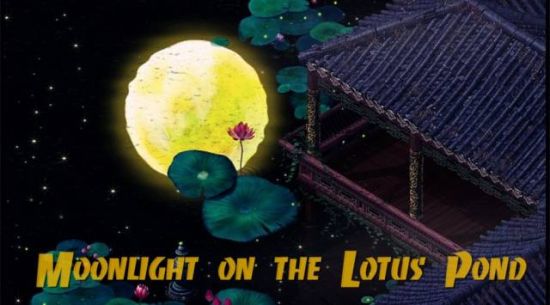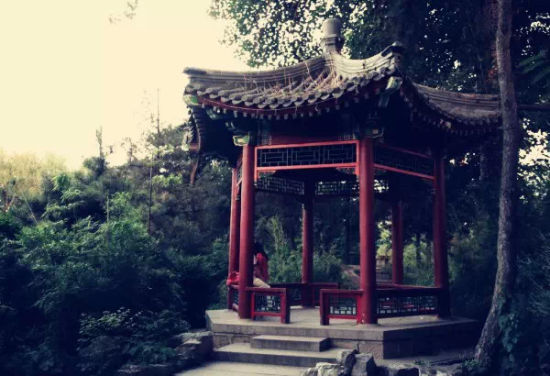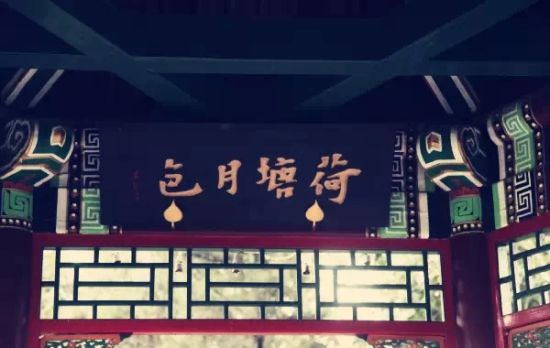翻译大神将荷塘月色译成英文版 美到没朋友
英文联播讯 翻译 朱纯深 沿着荷塘,是一条曲折的小煤屑路。这是一条幽僻的路;白天也少人走,夜晚更加寂寞。荷塘四面,长着许多树,蓊蓊郁郁的。
 那些年背过的荷塘月色翻译成英文 美到没朋友
那些年背过的荷塘月色翻译成英文 美到没朋友Alongside the Lotus Pond runs a small cinder footpath. It is peaceful and secluded here, a place not frequented by pedestrians even in the daytime; now at night, it looks more solitary, in a lush, shady ambience of trees all around the pond。
处理“蓊蓊郁郁”这一叠词,译者使用lush, shady来表现,其中前后相连的卷舌音"sh"从音韵上模仿了原文。
路的一旁,是些杨柳,和一些不知道名字的树。没有月光的晚上,这路上阴森森的,有些怕人。今晚却很好,虽然月光也还是淡淡的。
On he side where the path is, there are willows, interlaced with some others whose names I do not know. The foliage, which, in a moonless night, would loom somewhat frighteningly dark, looks very nice tonight, although the moonlight is not more than a thin, greyish veil。
有没有注意到,描写景物时汉文倾向于用形容词,而英文偏抽象的名词,“月光也还是淡淡的”被处理成“a thin greyish veil”,强化了一种难以言喻的朦胧感。
路上只我一个人,背着手踱着。这一片天地好像是我的;我也像超出了平常的自己,到了另一世界里。
I am on my own, strolling, hands behind my back. This bit of the universe seems in my possession now; and I myself seem to have been uplifted from my ordinary self into another world。
这一片天地好像是我的:This bit of universe seems in my possession now是不是有浮士德的影子?
我爱热闹,也爱冷静;爱群居,也爱独处。像今晚上,一个人在这苍茫的月下,什么都可以想,什么都可以不想,便觉是个自由的人。白天里一定要做的事,一定要说的话,现在都可不理。
I like a serene and peaceful life, as much as in company. As it is tonight, basking in a misty mooshine all by myself, I feel I am a free man, free to think of anything, or of nothing. All tht one is obliged to do, or to say, in the daytime, can be very well cast aside now。
“bask in”(沐浴在)是译者根据理解增添的意象。
这是独处的妙处,我且受用这无边的荷香月色好了。
That is the beauty of being alone. For the moment, just let me indulge in this profusion of moonlight and lotus fragrance。
"The profusion of"又是形容词抽象化为名词的例证,这的确是汉译英中一种常用的手法。
曲曲折折的荷塘上面,弥望的是田田的叶子。叶子出水很高,像亭亭的舞女的裙。
All over this winding stretch of water, what meets the eye is a silken field of leaves, reaching rather high above the surface, like the skirts of dancing girls in all their grace。
这句的难点是“田田”和“亭亭”二词。田田,形容荷叶相连、盛密的样子,又引申出形容鲜碧的、浓郁的意思,这里借喻了丝软的意象是否贴切,读者自己去体会。“亭亭”的翻译很到位,英文中很常用的说法。
层层的叶子中间,零星地点缀着些白花,有袅娜地开着的,有羞涩地打着朵儿的;正如一粒粒的明珠,又如碧天里的星星,又如刚出浴的美人。
Here and there, layers of leaves are dotted with white lotus blossoms, some in demure bloom, others in shy bud, like scattering pearls, or twinlking stars, our beauties just out of the bath。
微风过处,送来缕缕清香,仿佛远处高楼上渺茫的歌声似的。
A breeze stirs, sending over breaths of fragrance, like faint singing drifting from a distant building。
这时候叶子与花也有一丝的颤动,像闪电般,霎时传过荷塘的那边去了。
At this moment, a tiny thrill shoots through the leaves and flowers, like a streak of lightning, straight across the forest of lotuses。
叶子本是肩并肩密密地挨着,这便宛然有了一道凝碧的波痕。叶子底下是脉脉的流水,遮住了,不能见一些颜色;而叶子却更见风致了。
The leaves, which have been standing shoulder to shoulder, are caught trembling in an emerald heave of the pond. Underneath, the exquisite water is covered from view, and none can tell its colour; yet the leaves on top project themselves all the more attractively。
用project这一主动的用法处理“叶子却更见风致”,比“looks more attractive”更能表达叶子搔首弄姿的风情。
月光如流水一般,静静地泻在这一片叶子和花上。薄薄的青雾浮起在荷塘里。叶子和花仿佛在牛乳中洗过一样;又像笼着轻纱的梦。
The moon sheds her liquid light silently over the leaves and flowers, which, in the floating transparency of a bluish haze from the pond, look as if they had just been bathed in milk, or like a dream wrapped in a gauzy hood。
朱自清最美的一句话仔细想来却模棱两可,月亮把流水般的月光泻在叶子上似乎更和逻辑,这就是朱纯深的想法。floating transparency又是抽象名词,把一个动词短句“青雾浮在荷塘里”处理为一个短语“in the...transparency”插入在大的从句中,把汉语珍珠罗玉盘般的短句美成功转化为英语从句套从句的链式美。
虽然是满月,天上却有一层淡淡的云,所以不能朗照;但我以为这恰是到了好处——酣眠固不可少,小睡也别有风味的。
Although it is a full moon, shining through a film of clouds, the light is not at its brightest; it is, however, just right for me -- a profound sleep is indispensable, yet a snatched doze also has a savour of its own。
A film of clouds,形容词名词化。
月光是隔了树照过来的,高处丛生的灌木,落下参差的斑驳的黑影,峭楞楞如鬼一般;弯弯的杨柳的稀疏的倩影,却又像是画在荷叶上。
The moonlight is streaming down through the foliage, casting bushy shadows on the ground from high above, dark and checkered, like an army of ghosts; whereas the benign figures of the drooping willows, here and there, look like paintings on the lotus leaves。
 那些年背过的荷塘月色翻译成英文 美到没朋友
那些年背过的荷塘月色翻译成英文 美到没朋友塘中的月色并不均匀;但光与影有着和谐的旋律,如梵婀玲上奏着的名曲。
The moonlight is not spread evenly over the pond, but rather in a harmonious rhythm of light and shade, like a famous melody played on a violin。
荷塘的四面,远远近近,高高低低都是树,而杨柳最多。这些树将一片荷塘重重围住;只在小路一旁,漏着几段空隙,像是特为月光留下的。
Around the pond, far and near, high and low, are trees. Most of them are willows. Only on the path side can two or three gaps be seen through the heavy fringe, as if specially reserved for the moon。
树色一例是阴阴的,乍看像一团烟雾;但杨柳的丰姿,便在烟雾里也辨得出。
The shadowy shapes of the leafage at first sight seem diffused into a mass of mist, against which, however, the charm of those willow trees is still discernible。
找出汉语中松散的短句间的逻辑或空间结构,将之串成长句,是英语翻译的功夫,一般的翻译可能会这样处理:The leafage is shadwoy. It seems like a mass of mist. But the charm of those willow trees is discernible in the mist. 这就显得啰嗦也不够地道了。
树梢上隐隐约约的是一带远山,只有些大意罢了。树缝里也漏着一两点路灯光,没精打采的,是渴睡人的眼。
Over the trees appear some distant mountains, but merely in sketchy silhouette. Through the branches are also a couple of lamps, as listless s sleepy eyes。
 那些年背过的荷塘月色翻译成英文 美到没朋友
那些年背过的荷塘月色翻译成英文 美到没朋友这时候最热闹的,要数树上的蝉声与水里的蛙声;但热闹是它们的,我什么也没有。
The most lively creatures here, for the moment, must be the cicadas in the trees and frogs in the pond. But the liveliness is theirs, I have nothing。
忽然想起采莲的事情来了。采莲是江南的旧俗,似乎很早就有,而六朝时为盛。
Suddenly, something like lotus-gathering crosses my mind. It used to be celebrated as a folk festival in the South, probably dating very far back in history, most popular in the period of Six Dynasties。
“江南”究竟应该如何译是一个值得专题讨论的问题,在一篇散文中,纠结于江南的地理概念是没有必要的,所以译者只是大体译出了方位,以免破坏行文的美。
从诗歌里可以约略知道。采莲的是少年的女子,她们是荡着小船,唱着艳歌去的。采莲人不用说很多,还有看采莲的人。
We can pick up some outlines of this activity in the poetry. It was young girls who went gathering lotuses, in sampans and singing love songs. Needless to say, there were a great number of them doing the gathering, apart from those who were watching。
那是一个热闹的季节,也是一个风流的季节。梁元帝《采莲赋》里说得好:
It was a lively season, brimming with vitality, and romance. A brilliant description can be found in Lotus Gathering written by Yuan Emperor of the Liang Dynasty:
风流如何翻译也是个问题,在不同的地方,“风流”的意思的差别不小。想想看,“风流女人”“数风流人物”“名士自风流”“风流倜傥”“黛玉身体面庞虽怯弱不胜,却有一段自然的风流态度”这些词语中的风流都是一个意思吗?风流的季节又是什么意思呢?译者综合了青春和浪漫两层意思来形容,你觉得言尽其意了吗?
“于是妖童媛女,荡舟心许;鷁首徐回,兼传羽杯;棹将移而藻挂,船欲动而萍开。
So those charming youngsters row their sampans, heart buoyant with tacit love, pass on to each other cups of wine while their bird-shaped prows drift around. From time to time their oars are caught in dangling algae, and duckweed float apart the moment their boats are about to move on。
译者在处理“荡舟心许”时,花了不少心思,用“buoyant”表达了“舟荡而心荡,遂许于他人”的过程。
尔其纤腰束素,迁延顾步;夏始春余,叶嫩花初,恐沾裳而浅笑,畏倾船而敛裾。”
Their slender figures, girdled with plain silk, tread watchfully on board. This is the time when spring is growing into summer, the leaves a tender green and the flowers blooming, among which the girls are giggling when evading in outreaching stem, their skirts tucked in for fear that the sampan might tilt。
可见当时嬉游的光景了。这真是有趣的事,可惜我们现在早已无福消受了。
This is a glimpse of those merrymaking scenes. It must have been fascinating; but unfortunately we have long been denied such a delight。
(来源:英文联播)
- 只有用美图才能翻译清楚各国单词(图)2015-05-26 11:43
- 双语:美版甄嬛传开播全民赞一丈红神翻译2015-03-20 14:51
- 美媒:英文词汇“零翻译”在中国引发争议2014-05-05 10:39
- “五讲四美三热爱”的英语翻译(图)2009-11-09 10:41
- 美剧热的推手:海归翻译热衷字幕组不图钱2013-08-30 10:04

